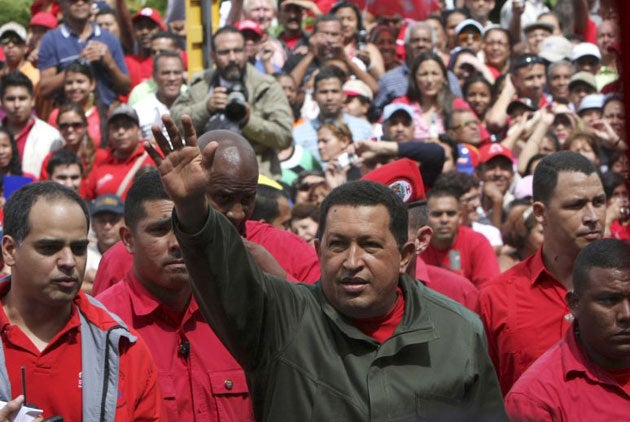Election setback for Chavez's leftist revolution
Sweeping gains for opposition in referendum on President's rule

Your support helps us to tell the story
From reproductive rights to climate change to Big Tech, The Independent is on the ground when the story is developing. Whether it's investigating the financials of Elon Musk's pro-Trump PAC or producing our latest documentary, 'The A Word', which shines a light on the American women fighting for reproductive rights, we know how important it is to parse out the facts from the messaging.
At such a critical moment in US history, we need reporters on the ground. Your donation allows us to keep sending journalists to speak to both sides of the story.
The Independent is trusted by Americans across the entire political spectrum. And unlike many other quality news outlets, we choose not to lock Americans out of our reporting and analysis with paywalls. We believe quality journalism should be available to everyone, paid for by those who can afford it.
Your support makes all the difference.The political map of Venezuela has been redrawn, after results from state and local elections showed the opposition to Hugo Chavez's leftist "revolution" was sweeping back to power in the capital, Caracas, and its three most populous states.
But both sides were claiming victory yesterday, with the government pointing out that of the 22 states (out of 23, plus the capital) that went to the polls, 17 were won by Chavez loyalists. They even included four whose incumbent governors had split from President Chavez and campaigned against his candidates.
"The path [we are taking] towards the construction of Bolivarian socialism has been ratified," Mr Chavez told the nation in the early hours, after arriving unannounced at a live press conference given by leaders of the ruling United Socialist Party of Venezuela (PSUV).
Turnout, at more than 65 per cent, was a record for local elections in Venezuela, reflecting the intensely polarised nature of the country's politics. President Chavez deliberately turned Sunday's contest into a plebiscite on his rule, saying 2009 would be "a year of war" if the opposition took key states. With his own popularity – after a decade in power – holding steady at about 57 per cent, according to one recent poll, the aim, said analysts, was to use this to boost the prospects of his party's candidates.
The President had also made it clear that he needed a good result in order to refloat a constitutional amendment, rejected by the electorate last year, which would enable him to extend his rule beyond January, 2013, when he is constitutionally obliged to step down.
Yesterday, he was claiming almost six million votes cast for PSUV candidates, compared with about four million for the opposition. But that calculation omits the impact of dissident "chavistas", and the picture is more complicated. "If we add ... the votes for dissident candidates who didn't win, but who obtained a significant number of votes, the majority voted against Mr Chavez's candidates, against the authoritarian centralism he represents," claimed Omar Barbosa, president of one of the two main opposition parties, yesterday.
The most impressive result was obtained by PSUV candidate Henri Falcón, in the western state of Lara, who got more than 73 per cent of the vote. But Mr Falcó*had been expelled from the party for disobeying Mr Chavez earlier this year, and although he won on the party ticket, he may prove an uncomfortable ally. The most dramatic results were in the capital and the neighbouring state of Miranda, which overlaps metropolitan Caracas.
Against the odds, opposition unity candidate Antonio Ledezma obtained an eight-point margin of victory over President Chavez's candidate, former education minister Aristóbulo Isturiz, in Caracas. And in Miranda, the country's second most populous state, Henrique Capriles comfortably defeated incumbent Governor Diosdado Cabello, widely regarded as the most powerful figure in the revolution, after Mr Chavez himself.
To compound the government's problems, Carlos Ocariz becomes mayor of Sucre in eastern Caracas, giving the opposition four out of the capital's five municipalities. Sucre, which is considered to hold the largest concentration of poor urban neighbourhoods in South America, had long been a stronghold of chavismo. Its loss confirms that the opposition is capable of building support among the poor – President Chavez's principal base.
Where it continues to struggle to gain a foothold is in rural Venezuela, which accounts for a small percentage of the population but a disproportionately large number of states.
One bright spot for the President last night was that his brother, Adan Chavez, defeated chavista dissident Julio César Reyes in the race for the family's home state of Barinas.
Mr Reyes, the Mayor of Barinas city, had been widely tipped by pollsters to win, because of spreading discontent over the Chavez family's alleged corruption. The current Governor is the President's father, while his mother and other brothers also hold key positions of power in the state.
Join our commenting forum
Join thought-provoking conversations, follow other Independent readers and see their replies
Comments